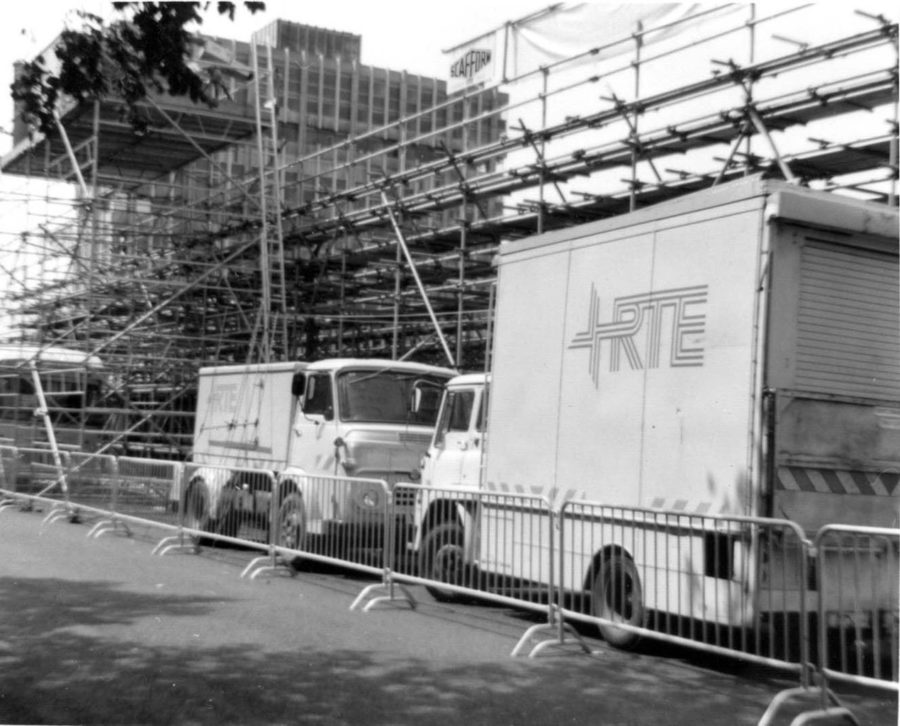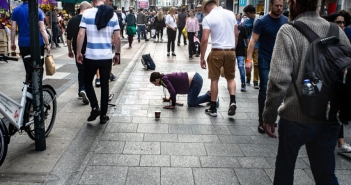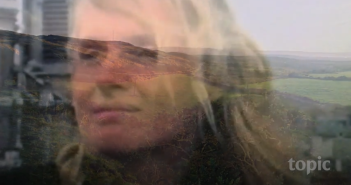Back in Dublin again, I was one of thirty, all-male trainees destined to become the camera, lighting and sound operators with the new television service. I started late, in November 1961 and found the first work ambience I had ever enjoyed. We were based in the hall of a school near Ringsend and then in a warehouse on Lower Middle Abbey Street, where we pre-recorded dramas and musical programmes for broadcast when the station would go on air.
So began a love/hate relationship with RTÉ which, though I have been a free spirit since 1969, has endured to the present day. My early attempts to become a writer, lover, lieder singer, piano player, actor, writer, travel agent all faded away like the morning dew, sublimated into this exciting new medium. My flibbertigibbet nature – as my father described it – had paid off. He had also described it as ‘divine discontent’, which I quite liked.
As I write, the TV station and I are sharing over a half-century of uneasy co-existence.
I spent the first two years as a sound operator, a job whose initial glamour soon wore off. Kevin McClory, producer of the early James Bond movies, once told me that it was as a lowly microphone boom operator he first learned how to produce films. He had regularly and stealthily let his boom microphone linger above the producers’ conversations. He learned their Machiavellian ways by eavesdropping.
However, for me, RTÉ was far from James Bond and after two years the old demon of boredom raised its fickle head. How much longer could I endure days of cable-bashing, boom-swinging, disc-playing, the only functions for which I was qualified, having no technical insight into the mysteries of sound?
Frustration was not alleviated by my occasional writing, which included devising and presenting a couple of radio programmes. Only concern at my parents’ likely final disillusionment postponed my certain departure.
In the new year of 1962 we moved into Montrose, the Michael Scott-designed television studios in Donnybrook. The place was soon named ‘fairyhouse’ after the alleged number of homosexuals employed. The term ‘gay’ had not yet been appropriated by that lobby. I could identify only a very few, among them Hilton Edwards, Head of Drama and Alpho O’Reilly, Head of Design. Alpho made no secret of his revulsion at the first appearance of finely-contoured mini-skirts in the canteen and corridors. I am still acquainted with the two first, magnificently-thighed girls who bravely wore them. Alpho disappeared one day and neither he nor his car were ever found.
There was also a popular young floor manager named J. whose wit was legendary. Once he was unlucky enough to hire a taxi driver who was openly ‘homophobic’ – years before that word was coined for queer-basher. It was a rainy night and J. caused the driver to search endlessly for an address. Finally when the destination was found and J. alighted, he left his umbrella on the back seat. The driver thrust it at him with the farewell: ‘Hey Fairy! Don’t forget your wand.’
Jeremy clutched his property, pointed it at the driver and said: ‘Turn to shite.’
The rest of us were boringly straight. But we had fun. Our coming-of age-occasion was when we dared have a drinking party on Good Friday when all pubs were closed. It was the initiative of Tom Mack, a fellow worker in the sound department who regaled us with tales of his enviable, and probably imaginary, sex life. Reality caught up with Tom: he was dismissed for sexually harassing a make up girl in a dressing room.
James Plunkett once described the RTÉ organisation to me as ‘compassionate’. He was referring to the organisation’s capacity for forgiving those who succumbed to alcoholism and other social diseases. But Tom Mack’s crime was sexual, which was beyond the pale. It was officially described in Civil Service terms as ‘moral turpitude’, and he ran away to England with the wife of the Head of Graphics. For an inhibited colleague like me, what was there not to admire about him? I was bored and desperate.
Out of the blue the cavalry came to my rescue. RTÉ management offered me simultaneously a choice of three jobs: production assistant for commercial radio programmes (which, with the hindsight of my detestation of consumerism, is ironic); trainee newsreader was the second offer – Mike Murphy was a fellow trainee. This was the initial path trod by most of the first batch of Irish TV personalities: Bart Bastable, Gay Byrne, Andy O’Mahony, Frank Hall, Bunny Carr, Terry Wogan et alia. I now murmur ‘Whew!’ at the narrow escape I had from the delusions of minor celebrity. But, as Kurt Vonnegut put it to me: ‘I could sure do with the money’.
The third offer was everyone’s dream job at the time: TV producer. It did not take any heart-searching to choose it. Looking back on my various jobs, I wonder how employers were blind to my chronic unemployability. Perhaps all they saw was malleable innocence and may have mistaken it for humility. If you can fake that you can fake anything.
I spent five busy years as a producer/director, working with some of the above talented people in programmes which included the original Late Late Show. But mainly I made documentary films, which enabled me to escape the straitjacket of a studio
In our youth in the Coffee Inn in Duke St. the late Nuala Ó Faoláin said to me: ‘You have unresolved adolescent complexes’. I had unwisely revealed my private thoughts to a journalist – worse, to a sophisticate. Twenty years later in West Virginia I met Nuala and happily told her I still had the same complexes, but now found them a useful spur to creativity. ‘Lucky you’ she said.
As I had recently produced a fictional memoir, Smokey Hollow, she asked my advice about doing the same. I could offer nothing except the jaded: apply thy bottom to a chair and start writing. Not long afterwards she began her acclaimed autobiography Are You Somebody? We had each learned that personal versions are the only antidote to objective reality. However, I was taken aback by her portrait of her father, bon viveur journalist Terry O’Sullivan, as the villain of her upbringing. He, a music lover, had once rung me in studio after a music programme which I had devised for Radio Eireann and wistfully said: ‘I wish I’d made that.’ I never met the man in person but it softened the feminist version of him later portrayed in Nuala’s book.
Ironically, Father Romould Dodd – another Dominican – head of Religious Programmes asked the powers-that-be in RTÉ that I, sceptic, agnostic, non-believer, take your pick, be appointed to his non-existent department. Thereafter, I could make films on any subject I liked. I would merely decide on a theme, meet Romould over his gin and tonic in the RTÉ social club, and tell him what I had in mind. He would nod approval, smile affably and regale me with tales of his time as a chaplain in the oilfields of the Middle East.
My illusions stayed with me when I was making documentary films. Early efforts concentrated on the old-fashioned truth that we are each a fallible link in a social chain made strong by cooperation i.e. we are completely interdependent. I even titled a film on the Cheshire Homes ‘The Weakest Link’ to argue that the apparently handicapped are just differently endowed and that the apparently healthy are just as handicapped, certainly less than perfect.
My penchant for fantasy was soon recognised by the new Head of Drama who invited me to join his department. I declined and told him about Robert O’Flaherty, maker of ‘Man of Aran’ and ‘Nanook of the North’, who had invited a friend to join him in documenting the lives of exotic and primitive peoples. The friend, John Grierson, replied that his personal preference was to document the lives of the savages in Birmingham. Grierson went on to found the National Film Board of Canada and become another hero of mine.
Meanwhile, I was finding out that my childhood version of Christianity was an imposter, a pretender. I had been led up the garden path. Fundamental Christianity and Socialism, though apparently deadly enemies, were actually the same thing and neither were being practised! Quite unconsciously I fell for the worst of both worlds and became that contradiction in terms, a Catholic Marxist, just like Arthur Dooley, the Liverpool sculptor. Dooley had shown my colleague Jim Fitzgerald and myself his absurdist two-story miniature Model T Ford which he had called after the Tory bigwig, The Sir Alec Douglas Hume. Because, Arthur explained, ‘it doesn’t work either’. Fitzgerald kept the sculpture until poverty forced him to sell it to Charles J. Haughey.
These vague ideas I tried desperately to reconcile, despite two realisations that blunted my idealism. The first was watching my films as they were broadcast under the RTÉ religious ‘Horizon’ banner every Sunday at teatime. The family would briefly glance at the screen (“Oh, another of yours’) and resume eating. The second was Catholic-induced guilt: I was a whited sepulchre. How could I preach social virtues to others when I myself was a confused hotbed of lust and decadence? How else explain being locked up with a cageful of prostitutes in a Parisian gendarmerie in 1966? Here is my version:
On the RTÉ rugby football team actor Frank Kelly (aka ‘Father Jack’) and myself were the centre three-quarters who outdid each other in physical unfitness. The team travelled to Paris to play the RTF (French TV) team and see the Irish/French international. Our ruthless opponents forced cognac on us and kept us up until 4.00 am. At 9.00 am we staggered onto the rugby pitch, were soundly thrashed and that afternoon saw the Irish team suffer the same fate. There was then another sorrow-drowning dinner with a cognac-scoffing competition and a French tie-snipping ceremony – presumably a symbol of our rugby castration that morning – which led to mild violence.
That night we attended a discotheque whose air I found suffocating. I climbed on to a window sill on the 2nd floor to get a breath of the balmy Paris night air and a little peace. It appears that some overwrought dancer then looked up, spotted my legs dangling overhead, screamed and gave everybody the impression that there was a suicide in the offing. Soon a group of uniformed men arrived to talk me down. I explained my breathing difficulties to the Gendarmes but they missed the point and insisted I come along with them. I did so, protesting mildly about free will and democracy.
That is how I ended up in a cage in the police station, being fed cups of black coffee and sharing mimed jokes with some ladies of the night who had also been rounded up. One of my team mates with a smattering of French finally persuaded the Gendarmes that I was not a serious threat to public order or myself, and they released me.
I continued my television campaign for illusory decencies until 1967 when the effort proved too much. My labours had produced no change in the world, certainly none apparent to me; the majority of people were as sensibly pragmatic as they’d ever been. Most were – to this arrogant observer – living unexamined lives, concentrating their energies on careers, ignoring my filmic exhortations to observe the lilies in the fields.
Literature gave me intimations that everybody lived unadmitted lives of quiet desperation. I remember devouring, on successive lunch hours in Kiely’s pub in Donnybrook, two books that were mind altering: R.D. Laing’s Politics of Experience and Peter L. Berger’s The Precarious Vision. I would defy any impressionable person of the time to read those books and carry on their normal humdrum lives. They certainly changed mine because I had not been defused by third level education, and was that homemade time-bomb, an autodidact. The first book questioned our definition of ‘normality’; the second demonstrated the relativity of all belief systems. They incited me to question the very ground on which I walked, and established a lifelong pattern of querying every fixed position.
I also got an insight from the late writer Francis Stuart.
In the Arts Club in Dublin I asked him whether he resented the likes of Frederick Forsyth making a fortune from reactionary potboilers while he had to soldier on modestly. ‘No,’ he replied. ‘I see myself as a backroom researcher. My findings will gradually filter down.’ This demonstrated to me his modesty as well as faith, hope and confidence, attributes to which I hopelessly aspired.
Stuart defined for me the only unique perspective a person possesses, the one that alone distinguishes him or her from their fellows: his ignorance. That cheered me up. Not possessing much talent but plenty of ignorance, it became my lifejacket. In his advice Stuart was echoing T.S. Eliot’s dictum: ‘what we know is what we do not know’, and ‘the only wisdom is humility’.
I became confident in my ignorance, enough to stop trying to conceal it, actually revelling in it. As a direct consequence a producer colleague once rhetorically asked whether I was very humble or very stupid. I answered that I was very stupid, which reply the arrogant wretch was forced to concede as quite clever, covering both bases. It even saved him a bloody nose. I discovered that an admission of ignorance on my part invited confidences from others. This proved invaluable in the making of documentary films.
I did not pause to assess the truth of Stuart’s or Eliot’s wisdom; I was too busy picking theirs and everybody else’s brains for answers. I thought Stuart’s was a good philosophy for a writer who sensed the abyss. It was not inconsistent with his youthful throwing in his lot with the Nazis, for which many would never accept his artistic excuses. Although I found his autobiographical Black List Section H to be a little self-serving, designed to de-nazify his reputation, its frankness was startling and his novels were thought-provoking. Francis Stuart was a devout, perhaps even a mystic Christian, who enjoyed a very long life and whose funeral I attended in County Clare.
The challenge of ‘that which we do not know’ is for me balanced by the insight that we are all in the same gluepot, just guessing, studying form. The exceptions are those – among them career academics, high priests and politicians – whose busy eyes and mouths are full of certain certainties. I could add much more on this subject, having spent the second half of my life trying to rid myself of what I learned in the first half.
I think I have by now earned an honorary PhD in ignorance.
In the sense that a doctor ‘practises’ medicine, never mastering it, I practised the art/craft of film for many years. Now I realise I was merely treading water, blundering around and, unlike doctors, unable to bury my mistakes: twenty of my films were recently re-run on Irish national television With few exceptions, they resigned me to the futility of any attempt at excavating truth or changing the world by one tiny iota. Rather late have I discovered that all change begins with oneself.
We rely on contributions to keep Cassandra Voices going.




